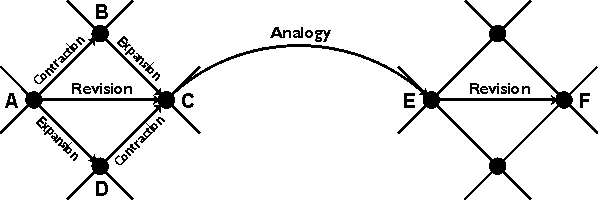Signs, Processes, and Language Games

Signs, Processes, and Language Games |
Next  |
John F. Sowa
Systems, scientific and philosophic, come and go. Each method of limited understanding is at length exhausted. In its prime each system is a triumphant success: in its decay it is an obstructive nuisance.Alfred North Whitehead, Adventures of Ideas

|
Questions to Consider |
 |
- How can we build large ontologies?
- How can we accommodate existing ontologies, databases, knowledge bases, and web sites?
- How do we relate them to natural languages?
- How do we reason with them and about them?
- What foundations do we adopt?
- What structures do we build?

|
Large Hand-Coded Ontologies |
 |
Three large ontologies:
- Cyc: 100,000 concept types with over a million axioms.
- Electronic Dictionary Research (EDR): 400,000 concept types with mappings to English and Japanese words.
- WordNet: 166,000 English word senses with related projects for other languages.
Building these things requires a great deal of time and money.

|
Small Hand-Coded Ontologies |
 |

Can such simple systems coexist peacefully with the grand ontologies?

|
Purpose of This Talk |
 |
- Propose a more flexible structure.
- Show how it can coexist with various kinds of systems, large and small.
- Show how it can support natural language processing.
- Show how it can support detailed deductions for knowledge-based systems.

|
Basic Assumptions |
 |
- The ultimate questions of what exists are being addressed by the natural sciences: physics, chemistry, biology, and astronomy.
- The structure and purpose of artifacts are being addressed by engineers, by artisans, and by everyone who uses them.
- The languages for talking about all these things are being studied by linguists and are being extended by people everywhere whenever they open their mouths.
- The role of the philosophers is to analyze these things and their interrelationships.
- AI researchers must apply logic, linguistics, philosophy, and computer science to the task of knowledge representation.

|
Foundations of Ontology |
 |
Semiotics by Charles Sanders Peirce:
- Signs of all kinds: Words, sentences, books, images, concepts, thoughts, and sensory inputs of all modalities.
- Logic and natural languages are important special cases.
Process philosophy by Alfred North Whitehead:
- The ultimate existents are processes.
- Forms are abstractions from processes that may be designated by signs.
- Objects are "permanences amidst the flux" that are characterized by "forms of definiteness."
Language games by Ludwig Wittgenstein:
- The meaning of a word is determined by its use in a language game.
- The number of possible language games is open ended.
- New language games are constantly being invented for special purposes as modifications or extensions of older games.
- Words only have a precise, formalizable meaning with respect to a particular language game.
- The same word may have different meanings in different games.

|
Language games for support |
 |
Consider the verb support in the following sentences:Tom supported the tomato plant with a stick.These sentences all use the verb support in the same syntactic pattern:Tom supported his daughter with $10,000 per year.
Tom supported his father with a decisive argument.
Tom supported his partner with a bid of 3 spades.
A person supported NP1 with NP2.Each use of support can only be understood with respect to a particular subject matter:
- Physical structures, financial arrangements, intellectual debate, or the game of bridge.

|
Different Games with the Same Pieces |
 |

Games of go and gomoku use identical pieces
Same syntax, but different scoring rules

|
How Language Games Work |
 |
The mapping from language to reality varies with each language game:
- Words are like playing pieces that may be used and reused in different language games.
- Associated with each word is a small number of lexical patterns that determine the rules that are common to all the language games that use the word.
- Meanings are deeper conceptual patterns that change from one language game to another.
- Metaphor and conceptual refinement are techniques for transferring the lexical patterns of a word to a new language game and thereby creating new conceptual patterns for that game.
- Words can only be formally defined (axiomatized) within a particular language game — contract bridge and auction bridge require different axioms.

|
2N+2 Hierarchies |
 |
Two hierarchies for each natural language:
- Words. A hierarchy of words and word senses, similar to WordNet and EDR.
- Canonical graphs. A partial ordering of conceptual graphs that express the lexical patterns associated with each word of each language.
Two language-independent hierarchies:
- Types. A lattice of all the concept and relation types that are used in the theories and in the canonical graphs.
- Theories. An open-ended, potentially infinite, lattice of all possible theories, each corresponding to a possible language game.

|
Accommodating Polysemy |
 |
Every new language game makes a word more ambiguous:
- Words. As many different senses as there are language games that use them.
- Fully specified concept types. Very narrow types express a single word sense that is used in only a single language game (theory).
- Underspecified concept types. Very broad types that contain only the meaning that is common to all their subtypes.

|
A Narrow Type Broadens |
 |

The many subtypes of the word che

|
Navigating the Lattice of Theories |
 |

Example: earth and sun map to the hydrogen atom.

|
Special-Purpose Theories |
 |

Belief-revision operators can accommodate such theories

|
Conclusions |
 |
- A single, consistent, all-encompassing theory is impossible, at least within the foreseeable future.
- The enormous number of special-purpose solutions aren't going to disappear overnight.
- The infinite hierarchy of theories can accommodate everything.
- Belief revision with analogy is essential to relate independently developed solutions.
Copyright ©2001, John F. Sowa